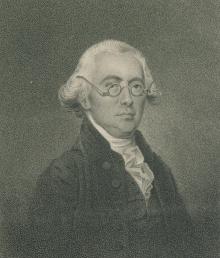- Home
- Archival Material
- College History Projects
- Subject-Based Digital Projects
James Wilson (1742-1798)

James Wilson was born in Scotland, near St. Andrews on September 14, 1742. Between November 1757 and June 1765 he studied at St. Andrews, Glasgow, and Edinburgh before he emigrated to Philadelphia. He was engaged as a Latin tutor at the College of Philadelphia for a time before he decided to enter a more lucrative profession and took up the law under the tutelage of John Dickinson. He was admitted to the bar in November 1767. He began his practice in Reading, Pennsylvania before moving to the more Scots-Irish town of Carlisle in 1771. There he quickly began a thriving practice in Cumberland County and seven neighboring counties. By 1774 he was well-known and respected; when in July of that year Carlisle came to open a committee on correspondence he was named as its head and also elected to represent the town at the first provincial conference in Philadelphia. At that time he was a Whig and on the extreme wing of that party; his future career would see him become steadily more conservative, to the point that his fellow Carlislians were to burn him in effigy within two decades.
At the outbreak of war in May, 1775, he was elected to the Continental Congress. Hard working and an impressive figure well over six feet tall, he served on several important committees, and urged careful consideration of moves towards independence. He helped Dickinson delay the July declaration but three weeks later approved and signed the Declaration of Independence. His industrious service of the running of the new national government probably helped his shift to the right, a movement which brought him into direct conflict with the new constitution of his home state and he was eventually removed from Congress in September, 1777. His transformation became complete as he re-established himself in Pennsylvania, when he took up residence in Philadelphia, left the Presbyterians to became an Episcopalian, and joined the Republican Society. Most conservatives, many of them open to the popular charge of war-profiteering, were taking a risk in remaining in a radical city and Wilson himself had to defend his home in October, 1779, from the city militia which came to expel him and his friends from the capital. Removed from politics until the conservatives regained some power in the state, Wilson devoted himself to a dazzling array of business endeavors and land speculations.
By 1787, Wilson had returned to Congress and had then been appointed a delegate to the Constitutional Convention. Here, his experience and his learning were invaluable as he was an important member of the committee which actually drafted the details of the document. His efforts were then turned to the ratification convention in his home state. These led to his effigy being burned in the town where he had made his early mark in the law. The success of the reactionaries in Pennsylvania was complete, however, when Wilson almost single handedly put together the new state constitution in 1790.
Under newly-elected President Washington, Wilson was named an associate justice of the Supreme Court in 1789, a position he retained until his death. In that same year, he became the College of Philadelphia's first professor of law. Meanwhile, his personal wealth, which had already suffered damage from the three years of tireless efforts to secure new constitutions for nation and state, continued to deteriorate. His hasty land speculation in New York and Pennsylvania failed and Wilson slipped into an indebtedness which would last the remainder of his life.
As a friend of William Bingham and others in Philadelphia and as trustee of the Carlisle Grammar School from its founding in March, 1773, James Wilson joined as a founding member of the board of the new college in Carlisle, named for his first mentor in the law. He remained a member of the Dickinson College board from its inception in 1783 to his death.
He had married Rachel Bird of Reading on November 5, 1771 and the couple had six children before her death in 1786. In September, 1793, Wilson married the nineteen-year-old Hannah Gray. Their son died in infancy and Wilson came under increasing mental pressure as debt collectors began to pursue him and efforts were made to impeach him from the bench. On August 21, 1798, while staying at the home of a friend and fellow justice James Iredell in Edenton, North Carolina, Wilson died. He was fifty-six years old.
Date of Post:
2005
College Relationship:
Trustee - Years of Service:
1783-1798